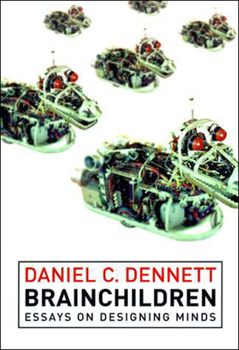Brainchildren: Essays on Designing Minds
(Part of the Representation and Mind Series Series)
Select Format
Select Condition 
Book Overview
A new collection of wide-ranging essays from one of cognitive science's most distingushed figures. Minds are complex artifacts, partly biological and partly social; only a unified, multidisciplinary approach will yield a realistic theory of how they came into existence and how they work. One of the foremost workers in this multidisciplinary field is Daniel Dennett. This book brings together his essays on the philosphy of mind, artificial...
Format:Paperback
Language:English
ISBN:0262540908
ISBN13:9780262540902
Release Date:February 1998
Publisher:Bradford Book
Length:430 Pages
Weight:1.54 lbs.
Dimensions:1.0" x 6.0" x 9.0"
Age Range:18 years and up
Grade Range:Postsecondary and higher
Customer Reviews
3 ratings
Cognitive challenges redux
Published by Thriftbooks.com User , 22 years ago
Clearly a "sequel" to Dennett's earlier "Brainstorms," this volume is an update collection of his thinking. The subtitle is pure Dennettian whimsy - "designing minds" - how many ways can you interpret that phrase. The minds within this collection are ours, those of machines, and of other animals. What part has evolution played in our mental elaboration? Is the mind a form of organic machine? This question has plagued philosophers for generations, but more intensely since the development of the computer. Much of the first section is devoted to clarifying the famous Turing Test - can a machine convince humans that it's "conscious"? Dennett's conclusion at this point is that it's possible but not likely practical. In essence, he doesn't care - it's simply not worth the effort.An essay co-authored with Nicholas Humphrey is of wider practicality and social importance. Is the syndrome known as Multiple Personality Disorder [MPD] a valid psychological disorder? Dennett and Humphrey probed deeply into this issue, sharply aware of the medical and legal implications. The authors' resolution of the question is unique, but will not be surprising to those familiar with the Multiple Drafts Model of consciousness spelled out in Dennett's "Consciousness Explained." Critics of "Consciousness Explained" are dealt with in a trio of essays. Dennett stresses that consciousness is an on-going phenomenon, not built up from a series of discrete events, as posed by some commentators. He repeats his objections to a "central processing location" in the mind, his appellation "Cartesian Theatre" restated anew.Artificial Intelligence is a major interest of Dennett's and he devotes a significant portion of the book to the subject. He sees much of the work in AI as providing essential contributions to the understanding of consciousness. After dealing with the imponderables of the "frame problem" in AI, he seemingly enters a wholly novel area. He poses a fresh approach to thinking about Artificial Life through a geographic metaphor. It is one of his more thought provoking "intuition pumps."In a new departure, Dennett also offers some autobiographical items for our consideration. His highly personalized account of witnessing the experiments with vervet monkeys in Kenya is an exemplary account of animal cognition. One of Dennett's strengths is his ability to deal with philosophical questions in an evolutionary framework.It is always difficult to fix a "starting point" for those unfamiliar with Dennett's work. The best introduction to his use of evidence and logical thinking, not to mention the power of his prose, remains Darwin's Dangerous Idea. Some of his ideas on cognition and ethics appear there, but it doesn't cover his innovative ideas on cognition, which remains the foundation of his work. Consciousness Explained or The Intentional Stance are the better overtures in that field. This collection may not fit the bill, except that his incisive thinking pr
Almost 5!
Published by Thriftbooks.com User , 24 years ago
Explore the philosophy of progressive, controversial author Daniel Clement Dennett as he takes you through a tour of cognitive science and artificial intelligence. Fundamental analyzation of the human, animal and silicon mind. Delve deep into philosophy of thinking, then come back and build an intelligent robot!
Excellent compilation of papers
Published by Thriftbooks.com User , 24 years ago
This is an excellent compilation of Dennett's papers published in all the kinds of periodicals he likes to publish. If you like Dennett's work, go for it. However, this is no introduction to his work, and I think that readers unfamiliar with it would be a slightly out of context. If you're looking for an intro to his philosophy, you should really go for his "kinds of minds" at the science masters collection.However, if you are already hooked (like me), you'll find some excellent, well-written, humorous, and intelligent essays that would otherwise demand a couple months (in a good library) to collect.






